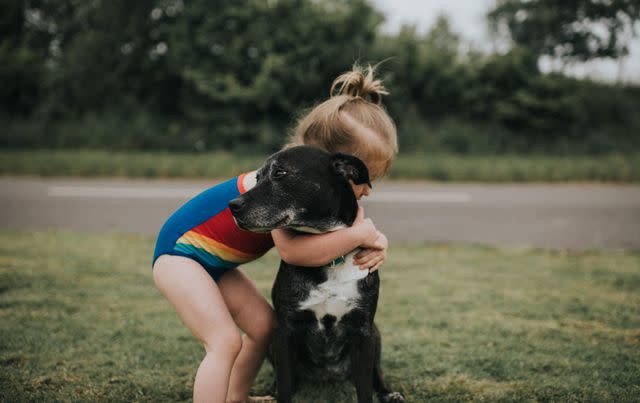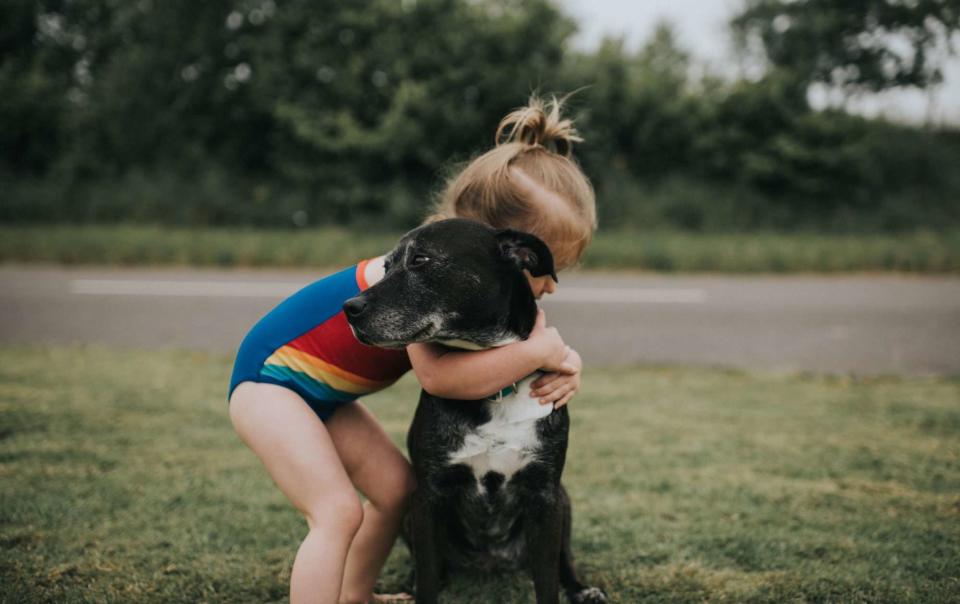6 Surprising Benefits of Pets for Kids
How can your family benefit from having a dog, cat, or fish? Here are some ways having a pet can pay off for your kids.
Fact checked by Karen CilliMedically reviewed by Michelle Felder, LCSW, MA
Children love their pets—and for good reason. Creatures large and small teach, delight, and offer a special kind of companionship. Fortunately, all that love for pets often translates into parents who welcome a furry (or perhaps not so furry) friend into the home.
Many children begin life in a family with domestic animals, and even more live with a pet at some point during their childhood, says Gail F. Melson, Ph.D., professor emeritus of developmental studies at Purdue University in Indiana and the author of Why the Wild Things Are: Animals in the Lives of Children.

When I was growing up, I always had at least one dog padding beside me on every adventure, and my wife was raised on a farm. So we planned all along to make animals a part of our child's life, and we are delighted by how enthusiastically our daughter, Natalie, has embraced pets.
Her natural zeal and passion for critters of all kinds has led to our current menagerie of one German shepherd, three cats, a freshwater aquarium, plus a confoundingly long-lived tank of mail-order Sea-Monkeys. And because we live on 4 1/2 acres of Pennsylvania woods, we are treated to an endless series of cameo appearances by turtles, mice, moles, frogs, toads, tadpoles, ducks, geese, and slugs—to name just a few.
Related: 7 Best Small Pets to Consider for Your Child
All these beasts have been beneficial to Natalie's development, but we've been surprised by how wide-ranging those benefits have been. Like most parents, my wife and I counted on the commonsense idea that having pets around would help teach our daughter responsibility and maybe empathy. But we've also learned that the presence of animals in our house helps foster her emotional, cognitive, social, and physical development.
And as it would turn out, it's not just our family that has benefited from the presence of pets. I've discovered there's plenty of solid evidence to back up how having a pet can pay off for kids and families alike.
Here are six benefits of pets for kids, along with the expert insight from pediatricians, professors, and authors that backs them up.
1. Pets Can Help With Learning
While book groups are the rage among her mother's friends, Natalie has her own reading tribe: We often find her curled up in her bed or lying in a den of blankets in a quiet nook of the house, reading to one or more of her cats. She pets them as she reads, stops to show them pictures, and asks them questions. She even reassures them during scary parts of the story.
That's no surprise, says Mary Renck Jalongo, Ph.D., an education professor at Indiana University of Pennsylvania and author of The World of Children and Their Companion Animals. Educators have long known that bringing therapy animals (mostly dogs) into schools helps many disabled kids learn. Now they're finding that all children can benefit from the presence of a nonjudgmental pal with paws. Dr. Jalongo adds, "If you're struggling to read and someone says, 'Time to pick up your book and work,' that's not a very attractive offer. Curling up with a dog or cat, on the other hand, is a lot more appealing."
2. Pets Can Provide Comfort to Kids
Animals can also be a great source of comfort. Dr. Melson asked a group of 5-year-old pet owners what they did when they felt sad, angry, afraid, or when they had a secret to share. More than 40% spontaneously mentioned turning to their pets. "Kids who get support from their animal companions were rated by their parents as less anxious and withdrawn," she says.
Whether a hamster or a horse, Dr. Jalongo says, an animal gives a child something to talk about and a shared interest with other kids.
Related: 4 Allergy-Friendly Pets
3. Pets Can Encourage Nurturing
Dr. Melson began studying the impact of pets in order to learn how human beings develop the ability to care for others. "Nurturing isn't a quality that suddenly appears in adulthood when we need it," she says. "And you don't learn to nurture because you were nurtured as a child. People need a way to practice being caregivers when they're young."
In our modern world, there's little opportunity for kids to provide for other living things aside from pets. "In many other countries, siblings look after one another, but in the U.S. that's not culturally acceptable," Dr. Melson says.
So how are the seeds of good parenting skills planted during childhood? Dr. Melson believes one way is through pets. In her research, she tracked how much time kids over age 3 spent actively caring for their pets versus caring for or even playing with younger siblings. Over a 24-hour period, pet-owning kids spent 10.3 minutes in caregiving; those with younger sibs but no pets spent only 2.4 minutes.
4. Pets Can Keep Kids Healthy
No expert on earth—not even the perky owner of the Happy Tails Grooming Salon a few blocks from my home—will go along with my theory that there's a direct link between Natalie's relatively small number of ear infections (two) and the number of cats in our home (three). So, OK, I'm probably wrong in thinking that felines lower a child's risk of otitis media. But there is reason to believe that animals can help protect kids from at least some illnesses.
According to a 2002 study by Dennis Ownby, M.D., a pediatrician and former head of the allergy and immunology department of the Medical College of Georgia, in Augusta, having multiple pets actually decreases a child's risk of developing certain allergies.
His research tracked a group of 474 babies from birth to about age 7. He found that the children who were exposed to two or more dogs or cats as babies were less than half as likely to develop common allergies as kids who had no pets in the home. Children who had animals had fewer positive skin tests to indoor allergens—like pet and dust-mite allergens—and also to outdoor allergens such as ragweed and grass.
And newer studies, such as this one done in 2018, also found a "dose-dependent" association between the number of pets a child was exposed to in the first year of life with the incidence of allergic diseases. In other words, the more pets, the fewer allergic conditions the child was likely to have. The study even cited the "mini farm" effect but noted that dogs and cats in the house were equally as beneficial.
No one knows for sure why this is the case, but Dr. Ownby has a theory: "When a child plays with a dog or a cat, the animals usually lick him," he says. "That lick transfers bacteria that live in animals' mouths, and the exposure to the bacteria may change the way the child's immune system responds to other allergens."
5. Pets Can Build Self-Esteem
A 2017 literature review on children and pets found that having companionship through a pet friend can help kids build self-esteem. "The review found evidence for an association between pet ownership and a wide range of emotional health benefits from childhood pet ownership; particularly for self-esteem and loneliness," the authors concluded.
6. Pets Can Build Family Bonds
One of the biggest benefits of pets is often unexpected, even for parents who grew up around animals: They can help families grow stronger and closer. "Whenever I ask children and parents if their pets are truly part of the family, most of them seem surprised—and almost offended—at the question," Dr. Melson says. The most common response: "Of course they are!"
A pet is often the focus of activities that families do together. Everyone takes the dog for a walk, shares in grooming and feeding, or gets down on the floor and plays with them. There are even benefits from simply watching a cat chase their tail or a fish swim in their tank.
Spending time in the care of pets offers the wonderful potential of slowing down the hectic pace of modern life. If someone asks what you've been doing, you might respond "nothing." And in this era of over-scheduled children and parents who are constantly on the go, "nothing" can be an important thing to do.
For more Parents news, make sure to sign up for our newsletter!
Read the original article on Parents.

